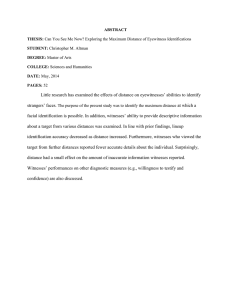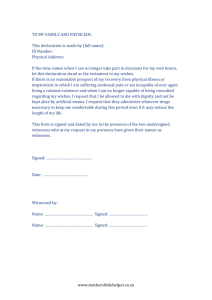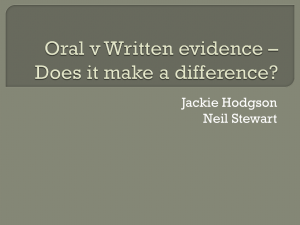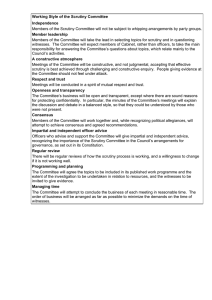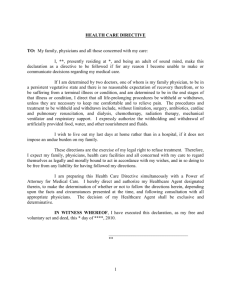WITNESS PROTOCOL 1. GUIDANCE FOR COUNCILLORS REGARDING WITNESS EVIDENCE.
advertisement
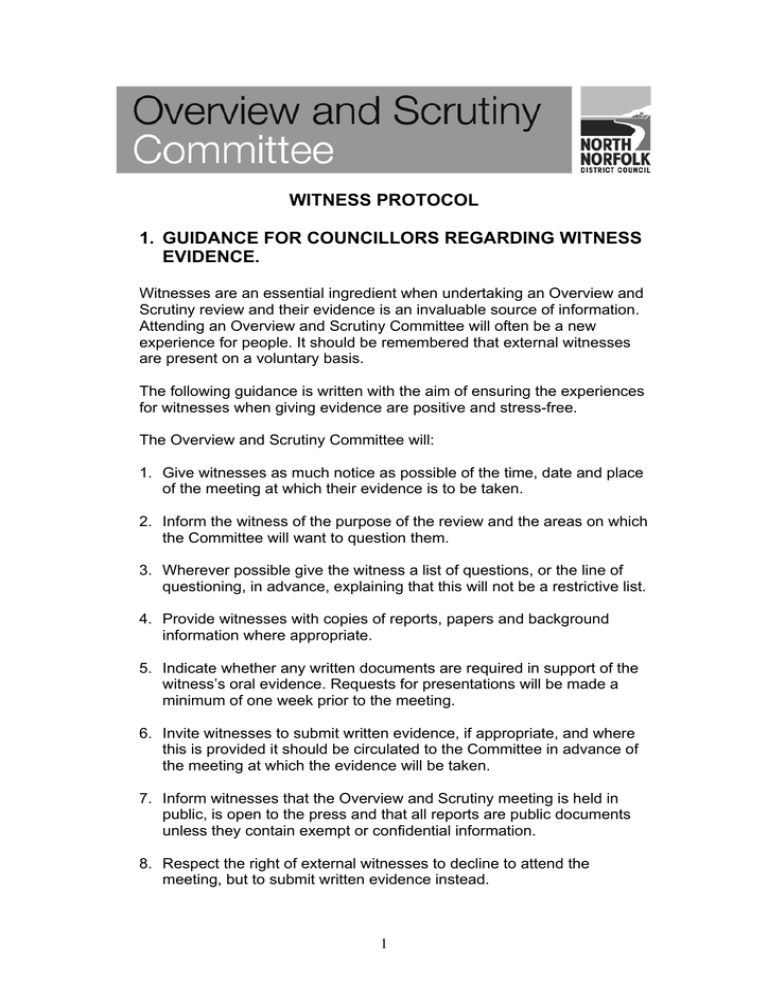
WITNESS PROTOCOL 1. GUIDANCE FOR COUNCILLORS REGARDING WITNESS EVIDENCE. Witnesses are an essential ingredient when undertaking an Overview and Scrutiny review and their evidence is an invaluable source of information. Attending an Overview and Scrutiny Committee will often be a new experience for people. It should be remembered that external witnesses are present on a voluntary basis. The following guidance is written with the aim of ensuring the experiences for witnesses when giving evidence are positive and stress-free. The Overview and Scrutiny Committee will: 1. Give witnesses as much notice as possible of the time, date and place of the meeting at which their evidence is to be taken. 2. Inform the witness of the purpose of the review and the areas on which the Committee will want to question them. 3. Wherever possible give the witness a list of questions, or the line of questioning, in advance, explaining that this will not be a restrictive list. 4. Provide witnesses with copies of reports, papers and background information where appropriate. 5. Indicate whether any written documents are required in support of the witness’s oral evidence. Requests for presentations will be made a minimum of one week prior to the meeting. 6. Invite witnesses to submit written evidence, if appropriate, and where this is provided it should be circulated to the Committee in advance of the meeting at which the evidence will be taken. 7. Inform witnesses that the Overview and Scrutiny meeting is held in public, is open to the press and that all reports are public documents unless they contain exempt or confidential information. 8. Respect the right of external witnesses to decline to attend the meeting, but to submit written evidence instead. 1 9. Arrange for witnesses to be introduced to the Chair of the meeting prior to the start of the meeting. 10. Introduce witnesses to the Committee. 11. Ensure all witnesses are treated with courtesy and respect. 12. Ensure all questions to witnesses are made in an orderly manner under the direction of the Chair and that councillors ask questions relevant to the objectives of the review. 13. Provide the review findings to all witnesses who request them. 2 2. QUESTIONING TO GAIN THE MOST FROM WITNESSES The evidence of witnesses to a review may often be the most valuable source of information. However, if the questions are not the right ones they may not be effective in soliciting the best information. Asking questions is not about profiling yourself, making a personal speech or arguing with witnesses. This can put them off giving evidence. Considering what questions to ask and the type of question to use to gain focused information often means preparation beforehand. Below are examples that can be considered. Question types Most people will be familiar with the two basic question types “open” and “closed”. These can be described as follows: Closed: These are used when you require a brief factual answer. They close down discussion. For example; “What is your name?” “Do you work in other organisations?” Open: These are used to gain more than a “yes” or “no” answer as they stimulate further discussion on an issue. For example; “Please give us an example of how your service has improved?” “Tell us about how your service is organised” But there are also some questioning styles which can elicit different types of responses and different outcomes. In preparing for questioning witnesses, it might be helpful to think about the way in which questions can be asked to get the outcome that you are looking for. Probing: Seek verifiable data and usually start with the words who, what, why, where, when or how. They are used to gather information about a situation. For example; “How much have we spent on this service this year?” “Who was consulted before the changes were implemented?” 3 Opinion finding: Ask for subjective information that gets at opinions, values or beliefs. They will help you understand views. For example; “Do you think people understand the services available?” “How do you feel the consultation went?” Getting the detail: This can help find out more specific detail from the witnesses. For example; “You mentioned costs a moment ago – can you be more specific?” “Explain that in more detail for us please.” Best/least questions: They are similar to opinion finding questions as they help test the limits of participant’s needs and wants. For example; “What is the best thing about the service we offer?” “What is the worst thing about the way we publicise our services?” Third party questions: These can help people express sensitive information and help uncover thoughts in an indirect manner. But be careful that they do not become leading questions. For example; “Some people say it takes too long to get a response from our services. How does that sound to you?” Crystal ball or hypothetical questions: These can help to explore questions. For example; “If time and money was no object, what sort of computer system would you design for the department?” Dos and Don’ts To make the best use of the time available for a witness, it is important to think about not only the type of question but also the way in which it is asked. The following suggests some things to think about: DO: • • • • Ask clear concise questions covering a single issue Ask challenging questions that will stimulate thought Ask reasonable questions based on what witnesses will know about Ask honest and relevant questions 4 • • Ask a question Allow time for thoughtful responses DON’T • Ask rambling, ambiguous questions that cover a number of issues • Ask questions that don’t provide opportunity for thought • Ask questions about issues not in the witness’s knowledge • Ask “trick” questions designed to confuse witnesses • Make a personal statement or speech • Let witnesses cross examine each other • Talk or leave the room when people are giving evidence 5 3. GUIDANCE FOR WITNESSES 1. Contacts Every review will be co-ordinated by the Overview and Scrutiny Officer. Please use them as your point of contact. 2. Topic Make sure you are clear on the topic and areas that the Committee would like you to address. If you are not sure ask the Overview and Scrutiny Officer. 3. Discussion Discuss your review with the Overview and Scrutiny Officer, especially if this is the first time you have given evidence to an overview and scrutiny committee. 4. Contribution Be prepared to be asked for your opinions and views as well as to give factual information. If you are asked to provide written evidence, make this as simple and concise as possible – if you are a Council officer remember that you are not presenting a committee report but providing information to help the councillors conducting the review. 5. Presentations If you have been asked, or have offered to give a presentation in relation to your evidence let the Overview and Scrutiny Officer know what equipment you will need. Please email your presentation to the Overview and Scrutiny Officer in advance to ensure that it is compatible with Council equipment. 6. The Meeting Members of the Committee want to make sure participants feel free and able to attend so they will ensure that meetings are as informal as possible and that you are able to contribute fully to the topic under review. 6
